Sure, sure; we’ve had this conversation before many times.
There are those that believe the market sets the true “value” and those who believe it is actually possible to over-pay or under-pay for a home.
But is there a difference between the “price” and the “value” in your opinion?
Let’s start off with an example involving a set of 80-year-old hockey cards…
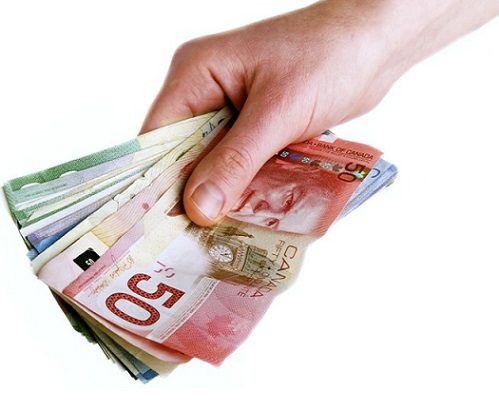
Is anybody else out there a self-described 35-year-old nerd?
Or is it just me?
I often mock people for their own hobbies and interests, when all the while, not really realizing how pathetic my own can be, in the eyes of others.
You are a car buff. You like looking at $500,000 cars you’ll never be able to afford, and talking about how fast the car can go, even though you aren’t legally allowed to drive it that fast, so it kind makes no sense to begin with. You see beauty, and I see a man’s shortcomings being personified in a piece of metal.
To each their own, I suppose.
But you might make fun of me for spending $400 on a piece of decrepit wood.
That’s right – this bad boy cost me $400:
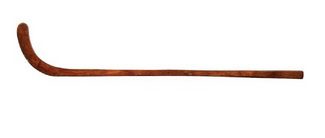
But who wouldn’t “value” this antique Ice Polo stick (ice polo was the precursor to Ice Hockey), stamped by Spalding in 1882, at a modest $400?
I would have paid more, to be honest.
Along with a pair of late 1800’s ice blades that I bought in Wyoming for a paltry $15 (I would have paid a lot more, but Americans don’t value hockey the way we do in Canada), and an incredible newspaper ad for wool suits from 1911 that shows “gentlemen” playing Ice Polo in those very same suits – it makes the perfect display for my office wall:
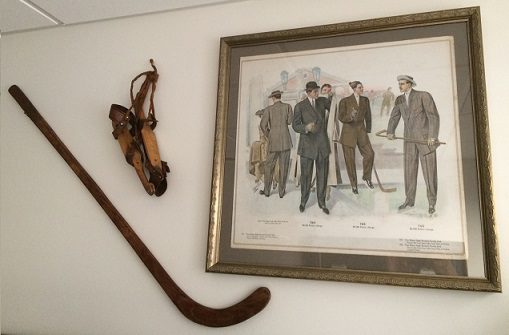
I love history.
I love antiques.
And I love sports relics.
During a spring auction at www.classicauctions.net, I saw perhaps the most exceptional set of hockey cards on planet earth.
The complete 1933-1934 Anonymous V129, all PSA-graded:
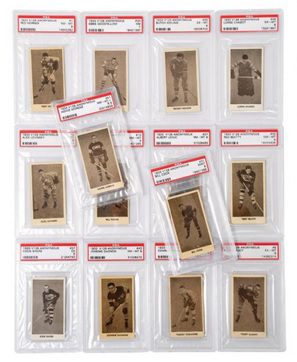
It’s “anonymous” because even eighty years later, card collectors are still arguing about who actually produced the set!
This set of 49/50 cards (okay so it’s not “complete” but damn near!) is all graded by Professional Sports Authenticators (PSA) who is the only name in the business worth having on your sports cards, including the only card in the world from this set with a “9” rating, and others at 8’s and 8.5’s. Have a look at the auction site HERE.
It’s the greatest set on the planet.
And with an opening bid of $50,000, it didn’t receive a single bid, and didn’t sell during the Spring 2015 auction.
So then…
What is this set of cards “worth”?
Is it worth $50,000?
More?
Less?
If you were to use the same logic as we use in real estate – that it’s worth what somebody is willing to pay for it, then you’d suggest this set is NOT worth the $50,000 they had it listed for.
But I’ll tell you something – if I was in my late-50’s, winding down my career, kids’ school paid for, and had money, AND had a guarantee that my wife would n-e-v-e-r find out I blew this kind of money on cardboard, well, I’d be a buyer. No doubt about it.
In fact, I think it’s worth more than $50,000.
I think this set could be worth $100,000, in the right hands.
So maybe that’s the issue – exposure?
Maybe this set of cards was only exposed on one auction site, and the audience wasn’t large enough, therefore the buyer pool was too small to maximize its value?
Or maybe that’s just my own justification for the lack of a sale.
How do we justify the lack of a sale in real estate?
Not by the same logic, that’s for sure!
But is that fair to do? Is it fair to use one set of logic and reasoning for one situation, and then the opposite for another?
I’ll give you an example…
A couple weeks back, a house came onto the market for $649,900, and it was perfect for my buyer.
I told her that this was a $700,000++ listing all day long, and that she should be prepared to go $725,000.
Anything higher than that, and I think we’d let it go. You always have to set a price ceiling when heading into competition on offer night, and I figured any number beyond that would be too rich.
The so-called “comparable sales” certainly would have justified a value of $725-$750K.
But oddly enough, on the day of offers, it was relatively quiet.
The listing agent told me there were “a handful of agents calling” and that she “expected three or four offers,” but when I went to present my offer at 7pm, she told me that I had the only registered offer on the property.
And you know what?
We got that damn house for $649,900.
What a deal! One of the best I’ve had this year, that’s for sure.
In my mind, my client just got a house that was “worth” $725,000, or let’s be conservative and say it’s $700,000.
But by the logic, “a house is worth what somebody is willing to pay for it,” she paid exactly what it was worth.
Should it be mentioned that offer night was the day before Canada Day, and that could have affected the mindset of buyers looking forward to a day off? Or are we in a market that’s so red-hot, buyers are glued to MLS during the birth of their first child?
As opposed to my hockey auction example, this property was exposed to a large target market. That hockey auction site is only frequented by diehards, and those who know about the site. It might be the largest hockey auction site in existence, but it’s not like that set of hockey cards had more than a few hundred eyeballs on it.
When we list a property on MLS in this Toronto market, we know that the entire market – those actually interested and looking, are going to see the property.
So would you agree with me if I suggested that my client got a “deal” at $649,900, and that this house is “worth” $700,000, despite the sale “price” of $649,900? Or do you just want me to stop using “quotes” like I’m “Chris Farley” on an old sketch on “Saturday Night Live?”
Let’s talk about another example.
A client of mine looked at a condo unit in a building that neighbours mine, and the unit – at $370,000, was hysterically over-priced.
The same model sold late last year for $330,000, and I certainly don’t think the market for this building has gone up 15% on an annualized basis.
The last sale of a similar unit in this building from only a few weeks back, based on square footage, would have put the value of this place in the high $340’s.
And wouldn’t you just know, after we made an offer on the place for more than we thought it was even worth, just to get a deal done, somebody with a competing offer ended up paying $376,000 for the damn thing!
There’s just no way to justify that, right?
Or would I be wrong in my assertion that my client who paid $649,900 for her house got a “deal,” and the person who beat us out for this condo by paying over-asking had “over-paid?”
You might think these questions are rhetorical, but they’re not. Leading, yes. Rhetorical, no.
My own personal bias aside, and those of you that know me, would expect that I’m telling these stories to prove a point and not to bitch and moan about losing an offer on a condo, I think the moral here is that the “price” and the “value” don’t always line up exactly, despite the logic, “it’s worth what somebody is willing to pay.”
My colleagues would kill me for saying this, but it’s true.
One of my colleagues always says, in response to a buyer who won in multiple offers, and paid a big number, “…..well they’ve got a house, and the other buyers got sh!t all!”
It’s often true.
The one’s saying, “They over-paid” are more often than not, those who came in 2nd, 3rd, 4th, 5th, and the list goes on.
But the real estate market is not as efficient a market as the stock market, where 5,000,000 shares of a stock, at $10, can trade hands in a tiny price band, with very little daily price volatility, and no emotional influence.
In the real estate market, we don’t have 5,000,000 houses to buy and sell that day. We might have only one in that given area, the price band can be huge, and there’s a ton of emotional influence.
I mean geez, I’m emotional just looking at that fine-ass set of 1933-34 V129’s! Maybe I could buy it for my wife’s birthday, and tell her it’s an investment?


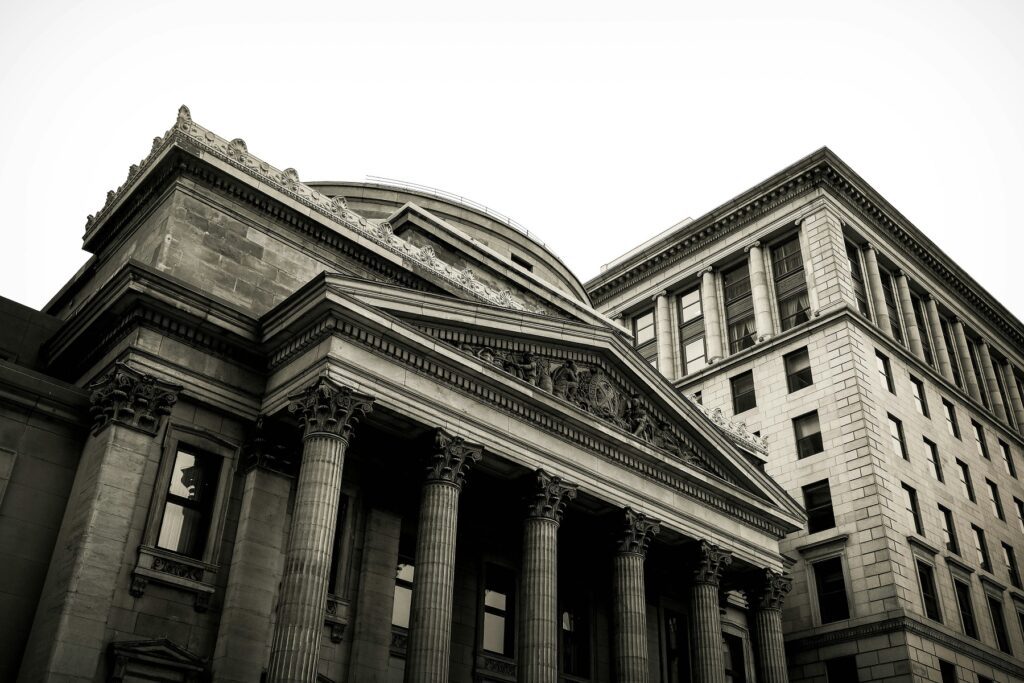




























Marina
at 10:24 am
If I had to put a definition to it, the value of a house as a pure asset is the average price you can sell it for if you had to urgently sell (I.e. There are multiple people willing to pay that price).
The actual sell price is the value plus the emotional and marketing premium, since a house is not purely an asset but also a place to raise a family a place to live in every day, etc.
On top of that, timing matters for many people. If you can wait, you may get a similar house for 50K less, but can you wait?
The same applies to those cards – they are an asset, yes, but they also carry an emotional premium for true fans, especially since collectors each have their own particular preferences.
That’s what makes these asset classes so interesting – they are not interchangeable.
daniel
at 3:21 pm
@Marina, one thing to note is that all appraisals (an attempt at evaluating a properties worth) assume an adequate period of market exposure, which implies that an urgent sale would achieve below-market value. That said, in Toronto it’s not as if you need a lot of time to price below market, set an offer date and get the bidding war going, so maybe an ‘urgent’ sale and a market sale are the same thing.
Someguy
at 6:49 pm
What about when the city decides what its worth for the purpose of property tax? How does a house that sells for $1m over on the Danforth get only $2k/year in property tax but a house in the annex for the same price has $8k/year?
Joe Q.
at 10:37 am
Because the value assessed for property tax does not follow in lock-step with sales prices. Give it a few years and the $1m Danforth house will catch up.
daniel
at 3:30 pm
Not only will the danforth go up in 2016 when they reassess, but there’s also a very real chance that the annex prop taxes will go down.
A quick primer on how prop taxes work:
1. city assesses every 4 years and phases in the assessment
2. each year they figure out the budget to run the city
3. the exact tax rate is calculated so that when multiplied by the aggregate assessed value of all properties (see point 1) it generates the amount of money required (see point 2)
So, imagine a city with two houses that are both the same price. The next year one goes up in value 20% and one goes up in value by 10%. Imagine the city budget stays constant.
The tax rate is going to go down by 15% because the total assessed value has gone up by 15% and the same amount of money is needed. The house that went up 20% will pay more taxes, and the house that went up 10% will pay less taxes (rate went down 15%, value went up 10%).
Appraiser
at 7:53 pm
Seventy percent of Canadians are homeowners and the other 30% want to be. Sports memorabilia in general and hockey collectibles in particular represent a tiny niche market by comparison. After all, sports relics precipitate almost zero intrinsic value – you can’t live in it and you can’t rent it out, but I suppose you can admire the hell out of it.
When it comes to price / value considerations in real estate, especially in Toronto, I have to agree with your colleague, “…..well they’ve got a house, and the other buyers got sh!t all!”
bugeyedbrit
at 8:55 pm
I remember when I bought my current house MPAC sent me a questionnaire asking me to help them determine how much more to charge me in property tax for my newly purchased abode, one of the questions was ‘Do you think you overpaid?’.Well duh!! I actually did think at the time we had overpaid, but even if I replied on this basis could not see what good it would do me. As it turned out I ‘forgot’ about this questionnaire and in the end MPAC assessed the house for less than our purchase price, so perhaps they also thought we overpaid ? Of course hindsight is a wonderful thing and I now regularly see similar houses for much more than we paid, but it still makes me think about how ‘overpriced’ the market might be.
Brandon
at 5:22 am
Nice Discussion….
http://www.homesulike.com/index.php/properties/buy/Independent-Houses-in-Hyderabad-for-Sale
daniel
at 3:18 pm
watching houses in our ‘hood sell and reading the mash regularly i’m really struck by how the market ebbs and flows from week to week and month to month. With the under price / bidding war model we have the prices really come out to how many houses in a certain range and ‘hood and how many buyers are in the market. Winter was nuts this year with tons of buyers and very few listings, and lots of head shaking deals. The buyers seemed think through the spring (even in early June when it’s supposed to have already slowed down) but there were a decent number of listings and prices were up but fewer insane, off value, transactions happening. Seems like the listings have stayed up but the buyers have all disappeared these last few weeks.and several ‘deals’ have been had. (i’m not a broker, just a RE nerd, so all of this could be woefully misinformed).
So, this is a long, rambling way of saying that the true value of the house can depend dramatically on the bid/ask dynamic of the market at any highly specific time – i.e. the value of your house was higher in mid-may when the swarms of buyers were out than it is today, when it’s quieter.
Kyle
at 4:01 pm
I noticed this too with houses in my hood, Late Winter and early Spring seem to always have droves of hungry buyers starved of listings all Winter long. And as they buy up the fresh new listings, setting new record comps sale prices continue to rise into mid-late Spring. But every year, there always comes a point where suddenly buyer fatigue kicks in or all the hungry buyers have purchased, and it seems like houses that would have gotten 10 offers the week before only end up getting 1 or 2. It seems like from one week to the next there could be a 4 – 6% difference in the sale price.
Appraiser
at 6:29 pm
The real estate market is subject to “seasonality” and always has been. A quick perusal of the following chart should illustrate how it works, pay particular attention to the fifth chart down (GTA average price). couretsy of guava.ca
Appraiser
at 6:30 pm
Oops, pressed the wrong keystroke too soon: http://guava.ca/indicators.html
daniel
at 4:03 pm
thanks @appraiser, interesting to see it graphed that way. I’ve been under the impression that it’s been more variable lately, however, the data doesn’t seem to bear this out. In the glorious tradition of the internet i think i’ll stick to my anecdotal impression and use a lot of caps lock to shout down anyone who disagrees
Appraiser
at 6:34 pm
P.S. As you can see, the highest average price is always in the spring or fall – year after year.
P.P.S. guava.ca data is derived directly from TREB.
Dave
at 10:23 am
The guava charts: aren’t those spring and fall peaks a result of the type of inventory that typically gets moved in those months? (i.e. a higher volume of SFHs vs condos resulting in a higher average price)
Joe Q.
at 10:59 am
By going deeper into the TREB data one could easily test that hypothesis… would do it if I had more time….
steve
at 8:34 am
summer is here …. the houses in my hood are sitting longer …